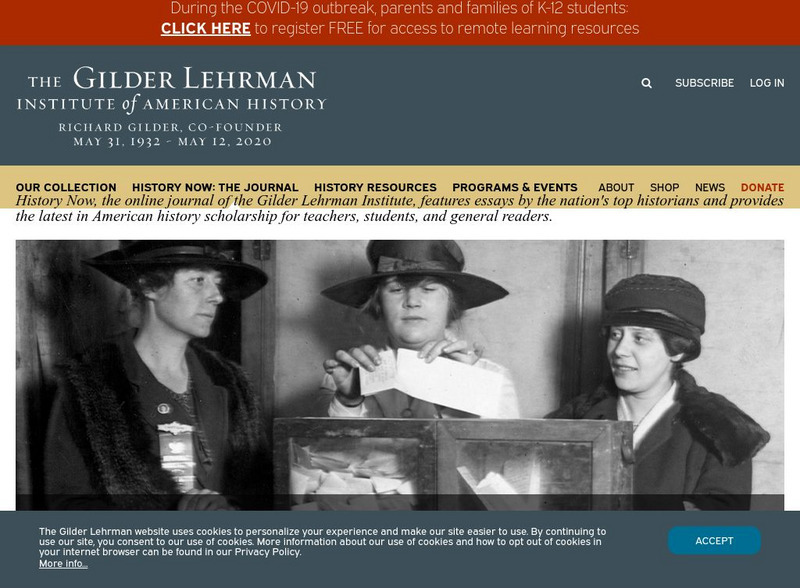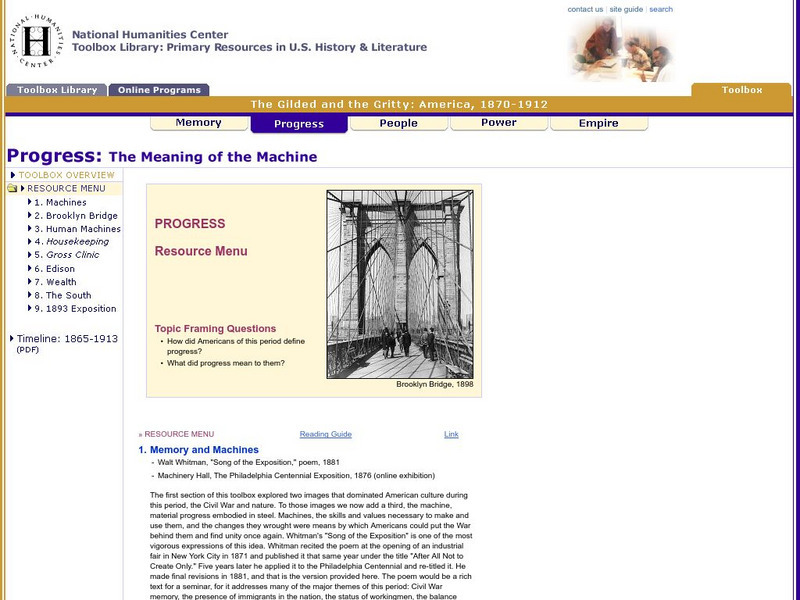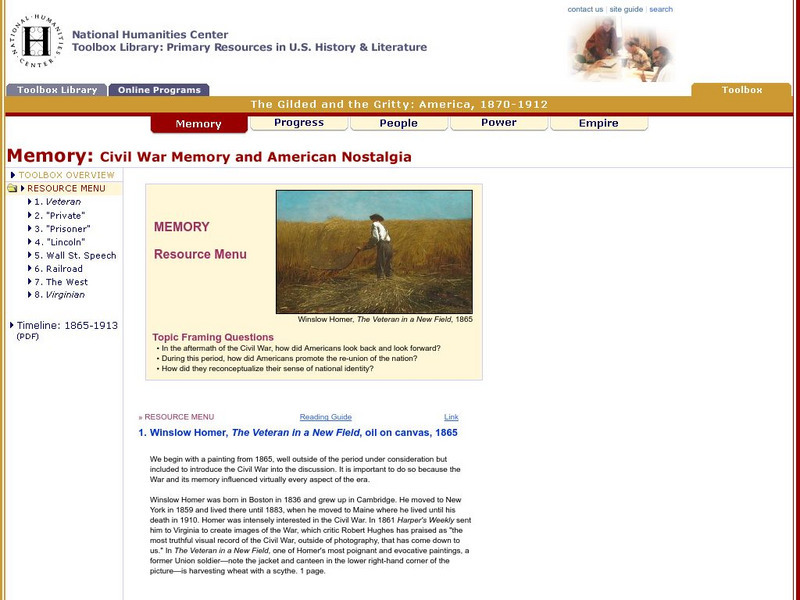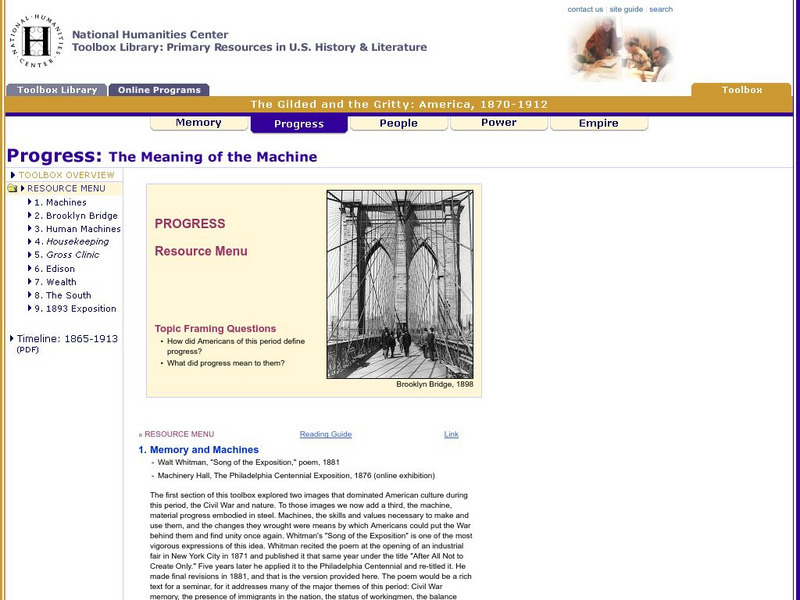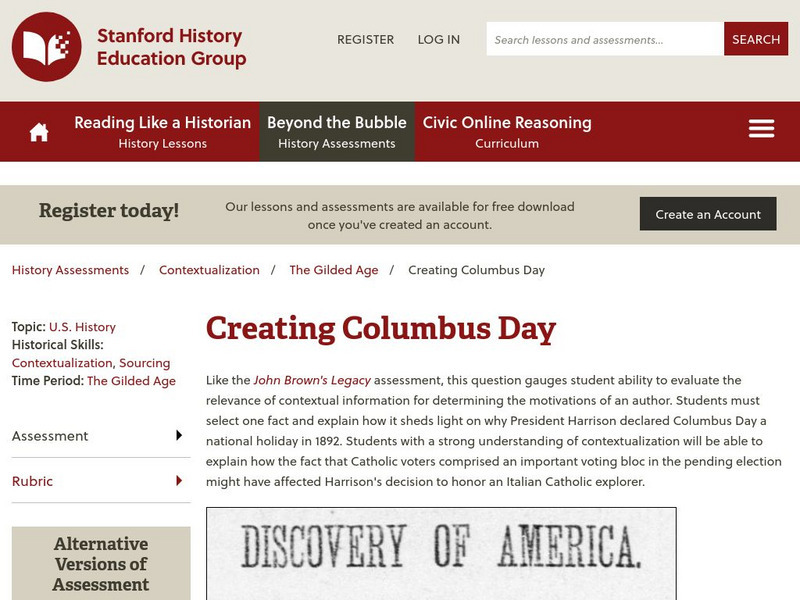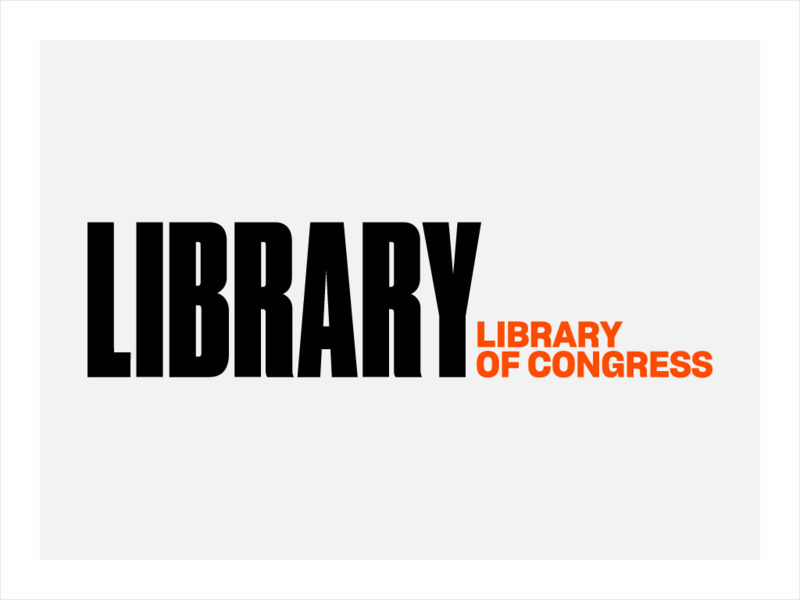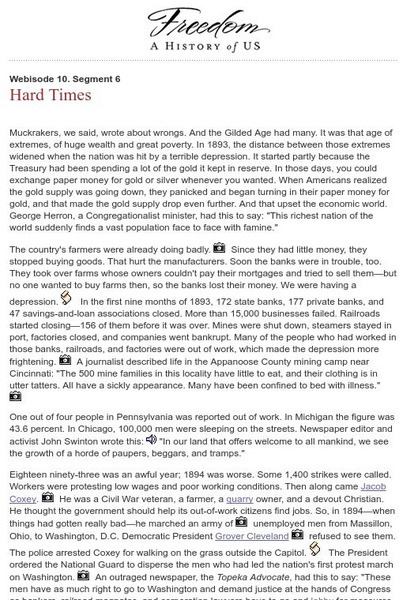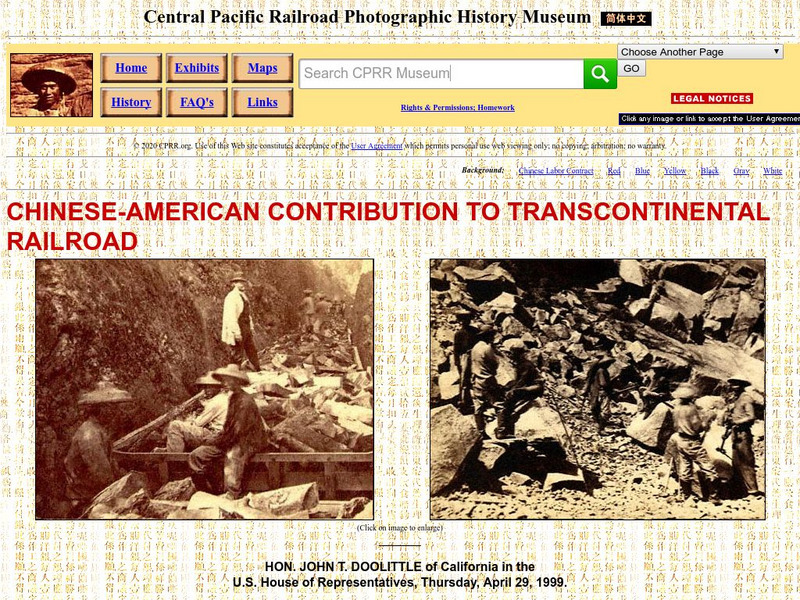PBS
Pbs Learning Media: Primary Source: Patronage/populism: Politics of Gilded Age
This collection uses primary sources to explore the politics of the Gilded Age.
Tom Richey
Tom Richey: The Gilded Age (1877 1900)
As Reconstruction came to an end in the United States the country began to evolve into an industrial nation through the perseverance and ingenuity of masterminds like Andrew Carnegie and John D. Rockefeller. Through a collection of...
The Newberry Library
Newberry Library: Chicago Workers During the Long Gilded Age
Learning module in which students use primary source material to examine the plight of workers in Chicago during the 19th and 20th Centuries, their efforts to make changes to working conditions and public response to those efforts.
Ohio State University
E History: Coal Mining in the Gilded Age and Progressive Era
A look into the coal mining industry in the Gilded Age through maps, timelines, images, and primary source documents.
Stanford University
Sheg: Document Based History: Reading Like a Historian: The Gilded Age
[Free Registration/Login Required] Young scholars read primary source documents to solve a problem surrounding historical questions. The Gilded Age unit highlights the turbulent changes that characterized the end of the nineteenth century.
Other
Industrialization, Urbanization, and Immigration in the Gilded Age
A study guide for an American History course that explores trends and issues from the Gilded Age. The guide has many links to key resources and primary source materials, as well as questions for further study or discussion.
Gilder Lehrman Institute of American History
Gilder Lehrman Institute: History Now: Immigration in the Gilded Age:using Photographs as Primary Sources
[Free Registration/Login Required] This resource presents a lesson plan about immigration that uses photographs as primary sources.
National Humanities Center
National Humanities Center: Toolbox Library: Gilded and Gritty: America, 1870 1912: Power: Taming the Octopus
A series of primary resources for students and teachers explores public response to the economic and political shifts during the Gilded Age. Includes questions for guided reading and links to supplemental material.
National Humanities Center
National Humanities Center: Toolbox Library: Gilded and Gritty: People: Assimilation and the Crucible of the City
Collection of ten primary resources on the culture, economy and politics of the Gilded Age between 1870-1913, with reading guide for discussion, timeline and links to supplemental material.
National Humanities Center
National Humanities Center: Toolbox Library: The Gilded and the Gritty: 1870 1912: Progress: The Meaning of the Machine
Nine primary source resources describing the way people thought about progress during the Gilded Age, 1870-1912. Includes guided reading, links to supplemental material, and timeline.
National Humanities Center
National Humanities Center: Toolbox Library: Memory, the Gilded and the Gritty: America, 1870 1912
Twelve primary sources - historical documents, literary texts, and visual images - that explore ways in which the memory of the Civil War affected American life in the last quarter of the nineteenth century.
National Humanities Center
National Humanities Center: Toolbox Library: Progress, the Gilded and the Gritty: America, 1870 1912
Eighteen primary sources-historical documents, literary texts, and visual images-that explore the industrial, racial, and technological progress of the late-nineteenth century.
Digital Public Library of America
Dpla: Patronage and Populism: The Politics of the Gilded Age
The resources here, including letters, photographs, official documents, and maps, represent the exodus of African Americans from the South to the Great Plains in the late 1800s.
Stanford University
Sheg: Reading Like a Historian: 1898 North Carolina Election
[Free Registration/Login Required] Lesson using primary resources on the 1898 election in North Carolina during the Gilded Age. Includes handouts, primary sources, and student questions. Requires free registration to access resources.
Gilder Lehrman Institute of American History
Gilder Lehrman Institute: Ap Us History Study Guide, Period 6: 1865 1898
[Free Registration/Login Required] AP U.S. History study guide on the social, cultural, economic and political changes that occurred during the period of American expansion, industrialization, and urban migration, 1865-1898. Learning...
Northern Illinois University
Northern Illinois University: American Populism, 1876 1896
Using essays, primary source documents, images, and video this site explores the American Populist political movement in the early 1890s.
Stanford University
Beyond the Bubble: Creating Columbus Day
[Free Registration/Login Required] Assessment in which students use a primary source excerpt from President Benjamin Harrison's proclamation of Columbus Day as a national holiday in 1892 and their knowledge of history to answer a given...
Library of Congress
Loc: Music for the Nation: Music Published, America, 1870 1885
A wonderful collection of sheet music from the Library of Congress. Search this site to find the primary source documents of music published in America from 1870 through 1885. The site is separated into many different topics with an...
Central Pacific Railroad Photographic History Museum
Cprr History Museum: Chinese Laborers and Construction of the Central Pacific
An article from the Utah Quarterly, Vol. 37, No. 1, by George Kraus, recounts the decision to use Chinese laborers in building the Central Pacific Railroad. Many primary source documents included as well as supplemental direct quotes in...
Library of Congress
Loc: The Learning Page: American Indian Reservation Controversies
Primary sources help students understand issues and controversies surrounding the American Indian Reservations of the 1870s. Historians provide different accounts and views of this facet of American history, and students utilize these...
The Newberry Library
Newberry Library: Literature of the American Civil War
Learning module uses primary resources to take a look at the literature published during the Civil War and examines how it helped make sense of the war and the profound changes brought about.
Library of Congress
Loc: Teachers: America at the Centennial
A lesson plan requiring student to analyze primary documents from the Philadelphia Centennial Exposition of 1876. Students interpret what these historical artifacts say "about the lives and values of Americans in 1876" among other things.
PBS
Wnet: Thirteen: Freedom: A History of Us. Printable Page
This article "Freedom: A History of US: Webisode 10, Segment 6: Hard Times," from Thirteen WNET New York, gives the reader an informative snapshot of the cause and impact of the Gilded Age depression of 1893. Students and teachers will...
Central Pacific Railroad Photographic History Museum
Cprr History Museum: Chinese American Contribution to Transcontinental
In April of 1999, Representative John T. Doolittle delivered a speech before the United States House of Representatives commemorating the contribution of Chinese-Americans to the completion of the Transcontinental Railroad. This site...





